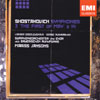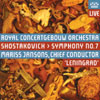Shostakovich Symphony Nos 3 & 14
Jansons rounds off his cycle in fine style – and returns to Leningrad
View record and artist detailsRecord and Artist Details
Composer or Director: Dmitri Shostakovich
Genre:
Orchestral
Label: EMI Classics
Magazine Review Date: 10/2006
Media Format: CD or Download
Media Runtime: 79
Mastering:
Stereo
DDD
Catalogue Number: 356830-2

Tracks:
| Composition | Artist Credit |
|---|---|
| Symphony No. 3, 'The First of May' |
Dmitri Shostakovich, Composer
Bavarian Radio Chorus Bavarian Radio Symphony Orchestra Dmitri Shostakovich, Composer Mariss Jansons, Conductor |
| Symphony No. 14 |
Dmitri Shostakovich, Composer
Bavarian Radio Symphony Orchestra Dmitri Shostakovich, Composer Larissa Gogolewskaja, Soprano Mariss Jansons, Conductor Sergei Aleksashkin, Bass |
Composer or Director: Dmitri Shostakovich
Genre:
Orchestral
Label: RCO Live
Magazine Review Date: 10/2006
Media Format: Super Audio CD
Media Runtime: 75
Mastering:
Stereo
DDD
Catalogue Number: RCO06002

Tracks:
| Composition | Artist Credit |
|---|---|
| Symphony No. 7, 'Leningrad' |
Dmitri Shostakovich, Composer
(Royal) Concertgebouw Orchestra, Amsterdam Dmitri Shostakovich, Composer Mariss Jansons, Conductor |
Author: David Gutman
At his second powerbase, Amsterdam, the most obvious “Jansons effect” has been to restore a less brash, more traditional blend to the orchestral sonority. This is not, in general terms, unwelcome, but the Leningrad may not be the right piece to show off the achievement. When the Royal Concertgebouw visited the UK with this work they won golden opinions all round yet, for all the personal involvement implied by his audible exhortations from the podium, Jansons doesn’t convince me that this is great music. For some of us, full suspension of disbelief comes only with the more subjective, interventionist interpretations of Leonard Bernstein (DG, 1/90) or Mark Wigglesworth (BIS, 8/97).
That said, if the coolly reflective, philosophical option is more to your taste you will find Jansons admirably lucid and enjoying a vast dynamic range: the first movement’s notorious invasion theme steals in as quietly as any. The actual sound of the relay, pleasing enough, is weighted in favour of the strings, and hence not always ideally clear: a few key woodwind lines get lost in the mêlée. The booklet includes both a useful, fair-minded interview with the conductor and a prefatory paragraph of lazy half-truths peddling speculation as fact.
Discover the world's largest classical music catalogue with Presto Music.

Gramophone Digital Club
- Digital Edition
- Digital Archive
- Reviews Database
- Full website access
From £8.75 / month
Subscribe
Gramophone Full Club
- Print Edition
- Digital Edition
- Digital Archive
- Reviews Database
- Full website access
From £11.00 / month
Subscribe
If you are a library, university or other organisation that would be interested in an institutional subscription to Gramophone please click here for further information.




